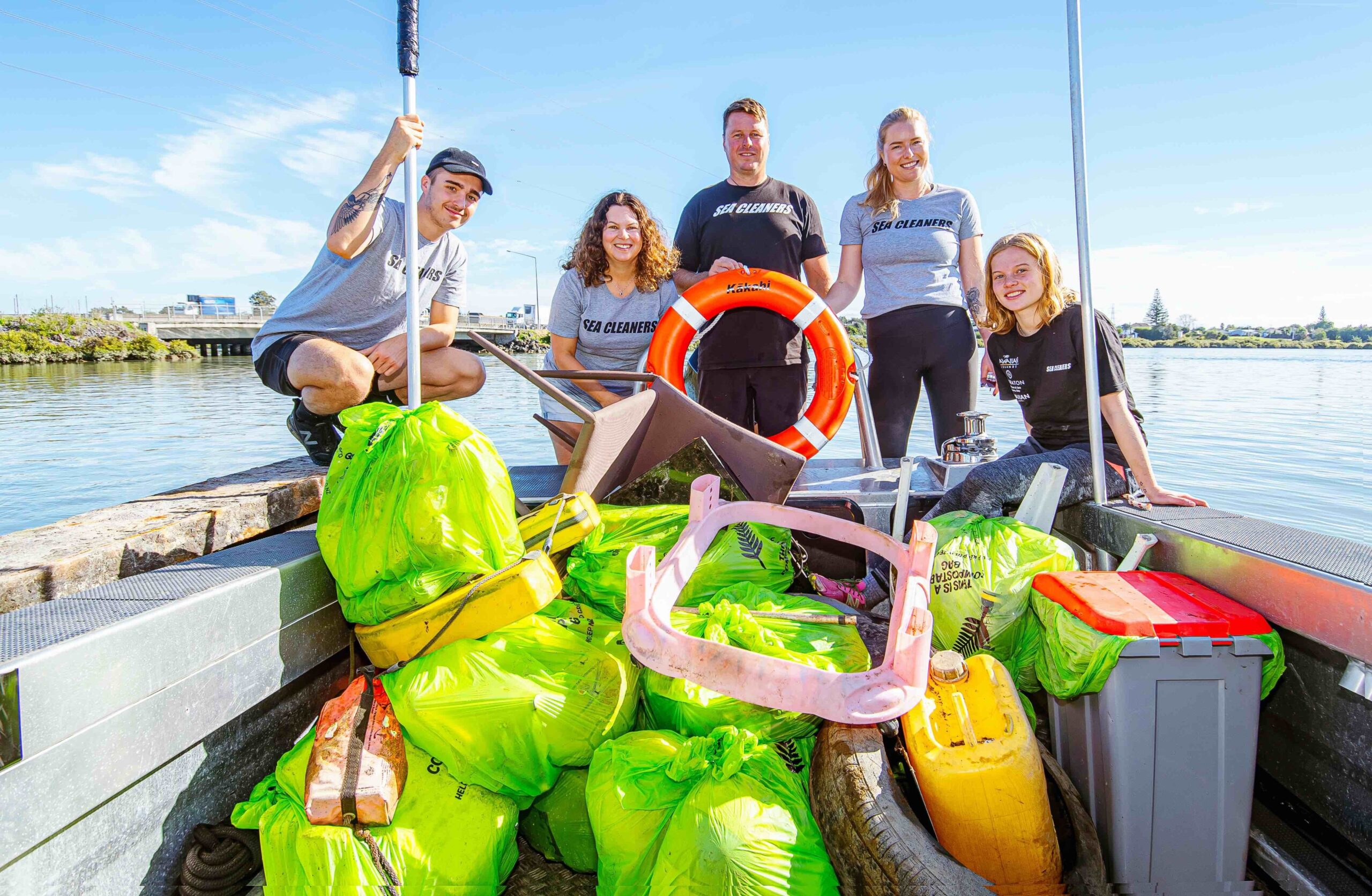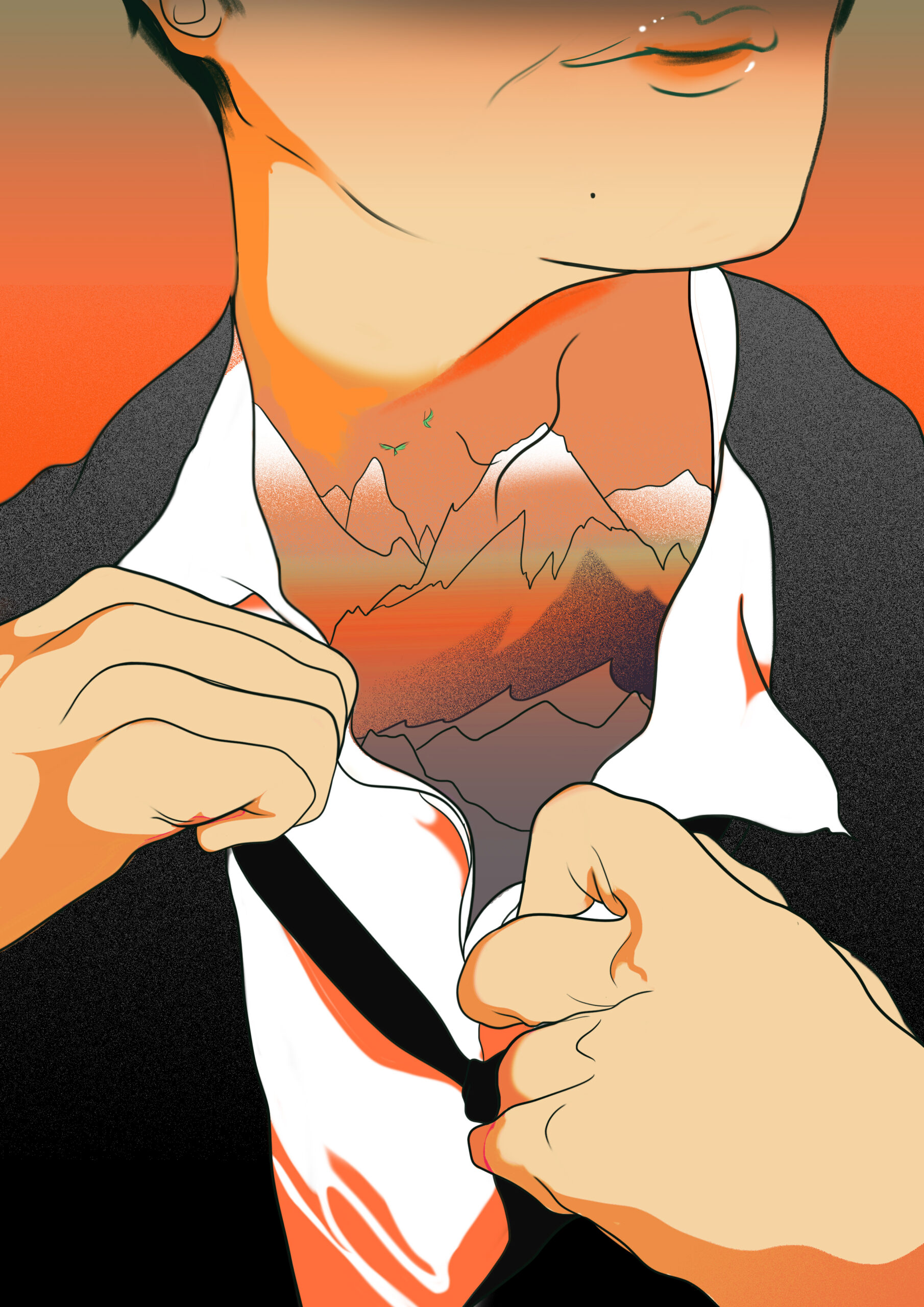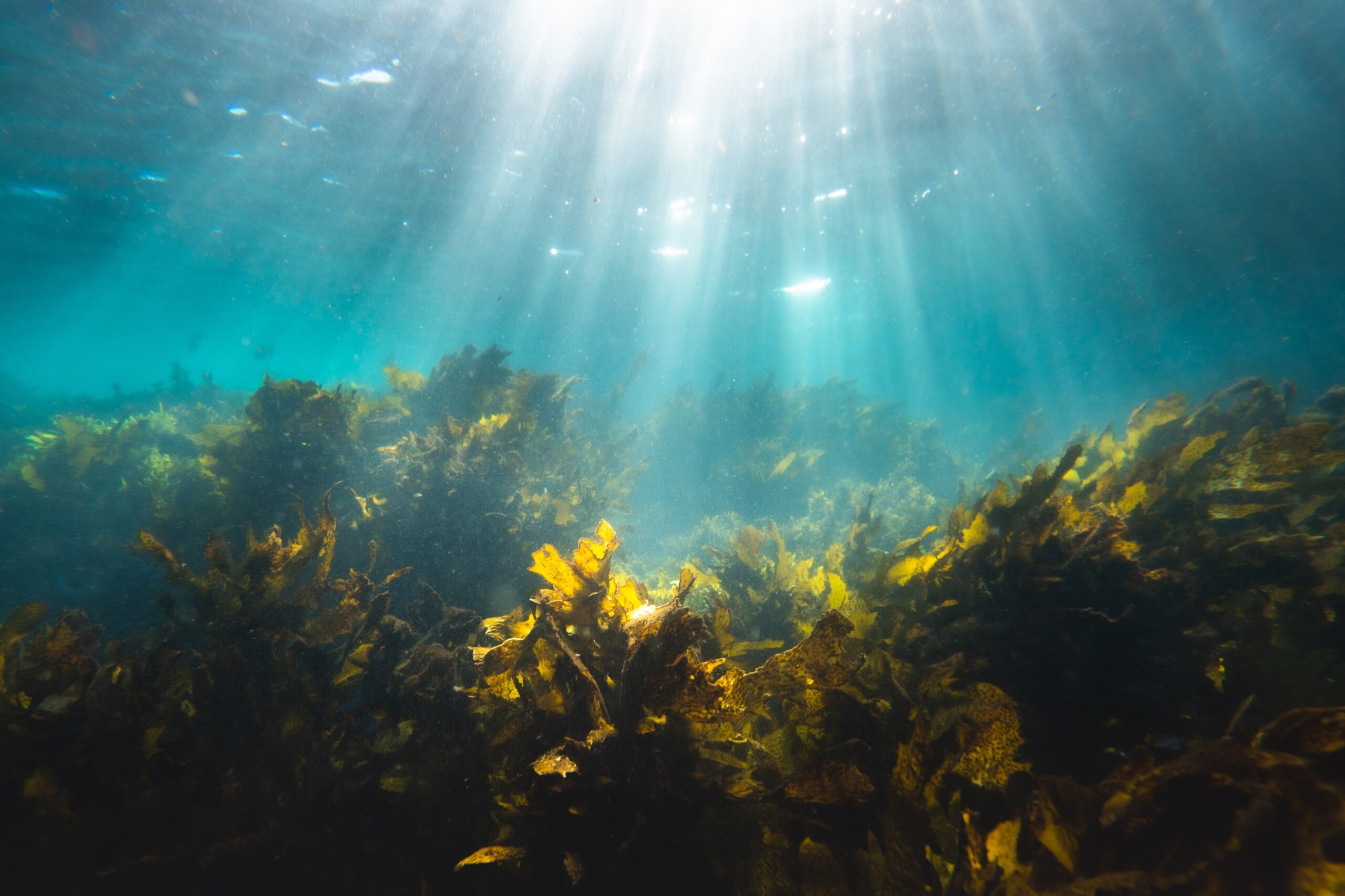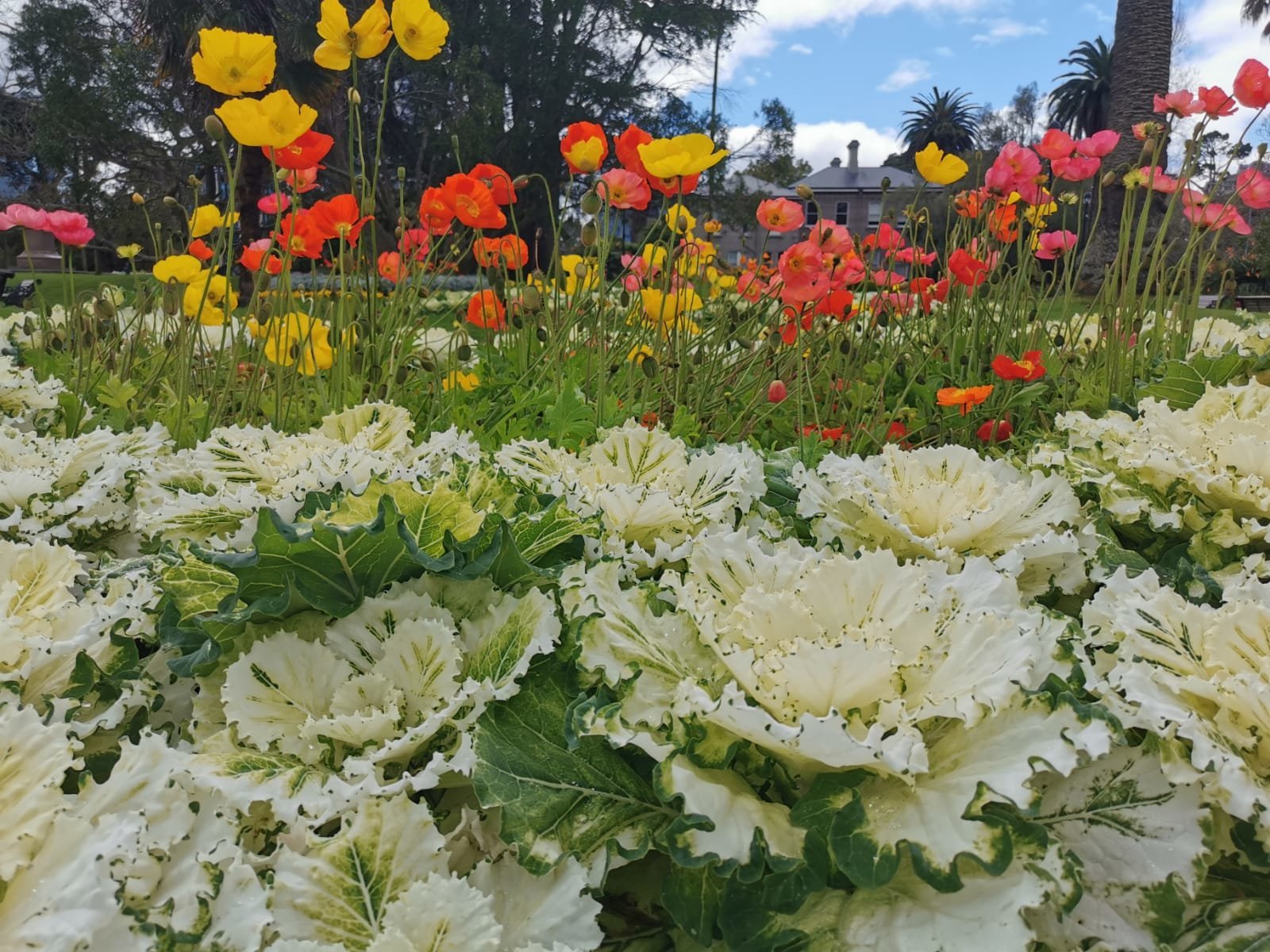Photography Andrew Coffey
The Good team recently joined Sea Cleaners for a day to help remove plastic and rubbish from the ocean.
To date, Sea Cleaners has pulled 10.9 million litres of rubbish out of the waterways around Auckland and Northland, and every helping hand has played a part in that statistic.
Good joined Sea Cleaners founder, Hayden Smith, and youth ambassador, Ede Bird, for a day to not only lend a hand but to document the important work that Sea Cleaners are doing.
We started with the sunrise to catch the right tide and headed across the Waitematā Harbour and up to the head of the Tamaki River, which is where Sea Cleaners concentrates its efforts in the tributaries.
It’s here where the storm water outlets flow into waterways, bringing rubbish and debris downstream from population centres.
Smith has been doing this for 19 years and his eyes are well trained for spotting floating plastic. He slows the boat whenever he spots any and we each take a turn scooping up bottles from the water’s surface with a net. And we haven’t even reached our destination yet.

When we do get there, it’s a matter of disembarking the boat into muddy mangroves that line the riverbank at low tide. Wearing lace-up shoes is a must to avoid losing them in the sticky mud. We’re astonished by the amount of microplastic but we’re instructed that today we’re just picking up the big stuff.
“That way we are preventing these bigger items from turning into microplastics,” explains Smith.
Sea Cleaners will return to tackle the microplastics on another day when timing isn’t quite so tight.

Our haul includes polystyrene, plastic bottles and tops, lollypop sticks, clothing pegs, tennis balls, single-use plastic food containers and plastic bags. Unexpected items are a suitcase, chair and TV! There are also a few tyres.
Each bag we fill represents 50 litres of rubbish. Every boat collects on average around 2000 litres daily. Currently there are three Sea Cleaners boats operating in the Auckland area collecting 160,000 litres of rubbish every month, which is the equivalent of five shipping containers.
Ede Bird, 17, joined the Sea Cleaners youth ambassador programme when she was 14. Smith was impressed by her speech, which she delivered as part of a sustainable schools programme for Auckland Council.

Two weeks later she was invited to travel to Hawaii with the Youth Ambassador Programme to help with a beach clean-up and to talk to schools.
Finding herself on Kamilo Beach, Hawaii – the third most polluted beach in the world – Bird felt overwhelmed.
“I can’t even describe the experience. You’re looking at the water and this entire stretch of sand coated in microplastic,” says Bird. “I spent two hours cleaning a 10cm square of microplastics, just picking it out, and when I left it looked exactly the same.”
The experience has opened Bird’s eyes to the extent of the plastic pollution problem globally. It seems no part of the world is off-limits, with microplastics recently detected as far as Antarctica.
In her work with Sea Cleaners Bird “doesn’t want to be too hopeful”.

“I think being too positive can discourage people from taking action and make them feel like, ‘oh, it’s all going to be okay. I’m good to sit back’,” she says. “But I think humans have a massive power to create and improvise, and my vision for the future is not that everything is perfect, but that all of us are working to create a better world.”
For Smith, 43, who was New Zealand Local Hero of the Year as part of the 2017 New Zealander of the Year Awards, he has a lifetime of work in front of him with no retirement in sight.
“We know there isn’t a human being alive on the planet that is ever going to see an ocean free of plastic. There’s just that much debris globally out there on our waters and it continues to come down off the streets through stormwater systems and we need to make sure that we are taking the right steps to make positive changes,” says Smith.

Recently Sea Cleaners received a boost thanks to a partnership programme with Emirates Team New Zealand and The America’s Cup, which has helped bump up the fleet of boats from four to 10. Funding through the Lotteries Commission and Department of Internal Affairs enabled the build of six new boats, which Sea Cleaners used in its role as traffic marshals during the America’s Cup. Now those boats will be deployed around the country as part of an extension of the Sea Cleaners programme.
“It has been an ambitious goal but we want to send these boats and crews out into every population centre in New Zealand,” says Smith. “We’re just in the phase of fundraising to support those teams to operate around the country.”
It costs $300,000 to run one boat for a year. The boat the Good team travelled in has been funded by the Coca-Cola Foundation for the past three years. Coca-Cola’s bottles in New Zealand under 1 litre and all their water bottles are made from 100 per cent recycled plastic, but even recycled plastic ends up in the ocean if not popped into a secure recycling bin, so supporting Sea Cleaners is one tangible way to help tackle part of the problem.

“We’ve got a number of funding sources from Auckland City Council, Northland Regional Council, and we’ve got other philanthropic funders that have come on board and other corporate sponsors that get on this too. It’s certainly one of the things that we are in desperate need of. We’ve got 10 boats to run so we need to be generating close to $3 million a year to support this programme,” says Smith.
Sea Cleaners currently has a boat operating in Northland, one on the outer limits of Auckland and two others patrolling the Waitematā and Manakau Harbours. The next one will go to the Bay of Plenty, followed by the Wellington region, Marlborough, Nelson, Canterbury and Otago.
“There’s always going to be more places that we can go but we can do one-off events in many other places with those boats and those teams as well,” says Smith.
“The vessels are all six or seven metre aluminum trailer boats that we can tow around the place and launch in different places, and that’s been the beauty of what we’ve been developing.”

Smith’s vision is for Sea Cleaners to provide support in different territories, including the Pacific, though that’s all going to take time and funding.
It’s big progress for a project that started off in a kayak for Smith, then aged 22. At the time he was in search of adventure and looking to get involved in the adventure tourism industry. One thing led to another and he found himself out on a kayak under the Auckland Harbour Bridge surrounded by rubbish back in 2000. “I thought the city was cleaning up the streets but why was no one out here doing it?” he says.
Smith spent the next two years drumming up support to enable that to happen and launched the first boat as part of the Waitematā Harbour Clean-up Trust.
Since then he has directed the coordination of more than 160,000 volunteer hours.

Sea Cleaners receives a lot of support from volunteers to go out on the boats and help with the clean ups, and that level of support really inspires Smith to keep going.
Since he began this work 19 years ago he has seen a reduction of rubbish floating in the harbour. Sea Cleaners has done so much work upstream pulling rubbish from the mud and mangroves that it is no longer completely full and overflowing.
“There’s still a lot there and no one is saying we’ve completely solved the problem but I think we’ve taken giant steps forward by removing 10.9 million litres of rubbish from our waterways. That’s going to make a difference and we’re visually seeing that,” says Smith.
Sea Cleaners is also doing work on land, running programmes in schools for pupils and parents to provide a geographical understanding of where rubbish goes and where it will end up, and how to prevent that from happening. This year their programme will reach over 40,000 students.

WHAT YOU CAN DO
Rubbish ends up in the ocean when birds pull stuff out of overflowing bins, dogs and cats rip open rubbish bags, trucks driving down the road lose insecure loads, food wrappers blow out of the car window or off boats on the water, and then the wind blows loose rubbish into our stormwater drains.
One significant way to help is to ensure your home rubbish is secure and to pick up loose rubbish you see on the street or beach to prevent it from travelling further.
“At the end of the day if we can all do that, we’re going to see a much cleaner ocean,” says Smith.
You can also volunteer for Sea Cleaners, which also has a strong youth ambassador programme. Some youth ambassadors have gone on to get their skippers license and now command their own vessels.
WHAT HAPPENS TO THE RUBBISH?
Much of the rubbish collected by Sea Cleaners goes into landfill because it is caked in mud, sand and silt, but a lot is recycled too.
All tyres go through a recycling system. Mussel buoys are returned to their suppliers for reuse or given to the zoo where animals can use them as part of enrichment programmes.
Sea Cleaners is negotiating with waste companies to remove over 180 tonnes of plastics from landfill a month. One of those alliances is with Future Post, which makes recycled plastic fence posts






